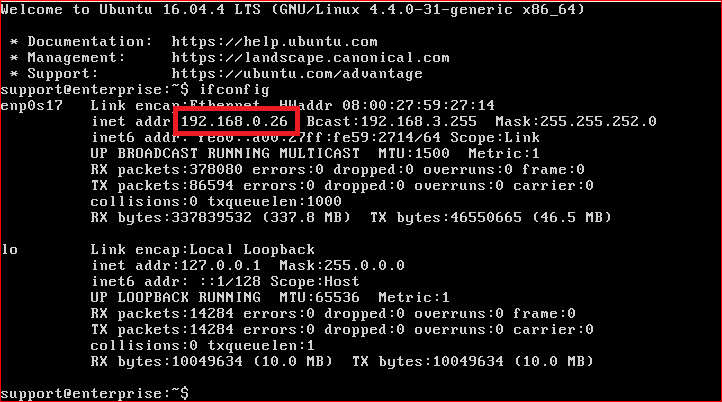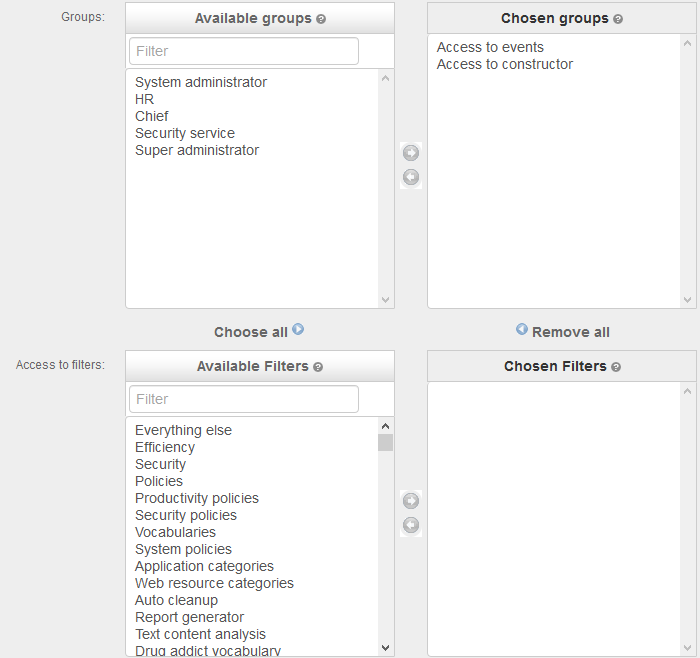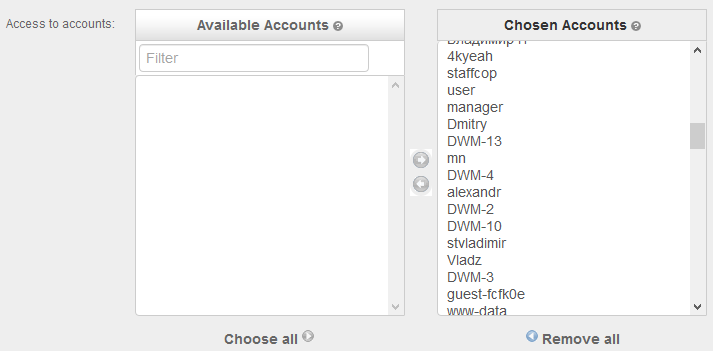Get started¶
This article contains the desxription of the main steps for starting user monitoring with StaffCop Enteprise.
Overview
Install StaffCop Server and estimate the system resources to fit system requirements.
Open admin panel and activate the system.
Install Endpoint agents on monitored PC.
Configure monitoring rules to fit infrastructure resources.
Start working with data received from computers.
Build reports and send notifications
Main settings of access to StaffCop Enterprise admin panel
StaffCop Server installation
Before installing StaffCop Enterprise Server estimate the hardware to fit system requirements according to the description in System requirements .
To install StaffCop Server you can use one of the guides on StaffCop Server installation.
After installation of StaffCop Server enter the Linux-console, authorize(supportsupport) and run command:
ifconfig -a
Get the IP for the field inet addr: - open your browser ( Mozilla Firefox or Google Chrome ) and enter IP address in the address-bar of the browser.

Open admin panel and activate the system.
When you first enter the admin panel a form for creating a password for the admin user will open. Create the password using latin alphabet and figures and press the Change password button. If you have lost the password for admin panel run the following command in the Ubuntu command line interface:
sudo staffcop passwd NEW_PASSWORD
When you see the autorization form opened, enter the admin panel with the login admin and the password you previously created and click the “Enter” button. Activation form opens. If you plan to activate the trial version, mark the “Trial” checkbox and input your e-mail. If you got the registration key, input it in the key field. Then click the “Activate” button.
Note
If the server doesn’t have access to the internet, request the trial key by sending letter to sales@staffcop.com. Having input the key, click the “Offline activation” button. Copy the certificate request in the text file and send it to the e-mail of technical support support@staffcop.com with the subject “Offline activation”. Attach your registration key to the letter. More details on activation can be found in Activation guide.
Agent installation
Having entered the admin panel of StaffCop Enterprise, go to the menu Control panel -> Computers -> Download agent” and select Agent for Windows or Agent for Linux.
To install agent use one of the instructions in the section Agent installation.
By default, agents and the server must be located in the same subnetworks. If they are located in different subnetworks you should configure 443 port forwarding for the server IP. If you need to collect data from the internet you should configure 443 port forwarding for internal IP to public IP and port. The easiest way to check availability of the server through 443 port is open the web-console on the PC with installed agent, by inserting https://your_server_ip:443
There’s also an ability to install agents via VPN - the gist of configuring the availability of the server and agents is the same as for local networks. To change the ports of the server use the instruction Change default 443 port.
When installing agents, don’t forget to add it to the exclusions of antivirus according to the instruction Antivirus exclusions.
Configure agents monitoring
After an agent is installed on a workstation it automatically gets registered at StaffCop Server if there are free licenses available. You can check the fact of this agent registration at the server by choosing Control panel -> Computers in admin interface. You will see the page with this agent’s entry in the list of agents. If you see the entry with the empty name, you should wait a bit, until the agent is registered and then refresh the list of agents in the admin panel. Agent’s name is received from the name of the workstation where it’s installed from its serial number or HWID of a workstation.
When an agent is registered at the server, it receives the configuration called Default Config. This is the configuration it gets settings from to define the rules of monitoring events on a workstation.
Default config is created only for receiving information on user activity in applications and web-sites (time tracking) and register keystrokes (keylogger). To perform full monitoring on all user actions you can assign another configuration - Total control.
Which requires the following steps:
Open “Control panel -> Computer configurations”, select Total Control from this list.
Switch to “Assign agents” tab.
Using the navigation buttons you can assign configuration to agents. For example, click the “Choose all” button under the field “Available agents” , then they will be transferred to the field “Chosen agents:”
Click Save.
You will find more details in this article.
In a couple of minutes the new configuration will be applied on the chosen workstations.
If you meet any troubles with performance or unavailability of network resources on a PC with installed agent then switch it to Default config and study the detailed guide on configuration or consult our support team.
You will get more details on configuring here.
Pay attention to setting antivirus exclusions.
If the agents and the server are correctly configured but the data is displayed in past or future that means the time zones of the agents and the server were setup incorrectly. Check that everything is configured in accordance with the guide for changing the time zone.
Start working with data
To work with the data collected from agents the following tabs are used: Constructor and Filters. The principle of work is in the selecting elements in Constructor.
Constructor contains main dimensions on categories.
Having set the number of filters it can be saved with the means of filters navigation panel.
Details on saving filters are given in the instruction Filter navigation panel.
Filters - represent filtration parameters set in Constructor and saved.
Let’s a consider an example of working with data
Switch to Constructor and choose Event type.
Then select Keyboard input.
Then switch to Computer dimension and choose the Computer you are interested in.
In Lens (top right part of the window) choose Facts -> Table as the view mode.
Click Save and set the name for the filter in the pop-up window, saving the filter.
Switch to Filters and open the filter you have just created.
You can set Period to be the range of 7 days.
As a result the filter parameters will be displayed on the bottom panel when choosing the filter (Computer and Event type - Keyboard input). And the table of facts will display only the events on the chosen computer and event type Keyboard input.
Build reports and send notifications
Constructor menu can be divided into two parts:
Data view modes
Report modes
View modes are represented by the menu items in Facts and Analysis. Report modes are represented by all the other menu items being various report patterns. Let’s take an example. We need to download a table on web-site visiting:
Let’s take an example. We need to download a table on web-site visiting:
In Lens (top-right part of the window) choose Analysis -> Table.
Select Website -> Domain.
Choose Activity time as the measurement type.
In Constructor select Computer -> Computer name.
Click Export and printing button.
Configure administrators
Open Admin menu and set the required permissions.You can find more details in the article Administrators.
For example you need to hide Admin menu, restrict access to list of users and give access to the entire tree of filters. Follow these steps:
Open Control panel -> Administrators.
Set permissions for the new account:
Groups: Access to events and Access to constructor.
Filters: all the filters must be in the column Available:
Accounts: transfer users from the column Available: to the column Chosen: which can be seen by the user of admin panel.
The result should be similar to that on the picture:


Warning
If you add at least one filter to the Chosen: column, then users in Constructor won’t be displayed at the moment of sign in the account. To view facts on them, you should open the Filters tab and choose the filter assigned to the account.